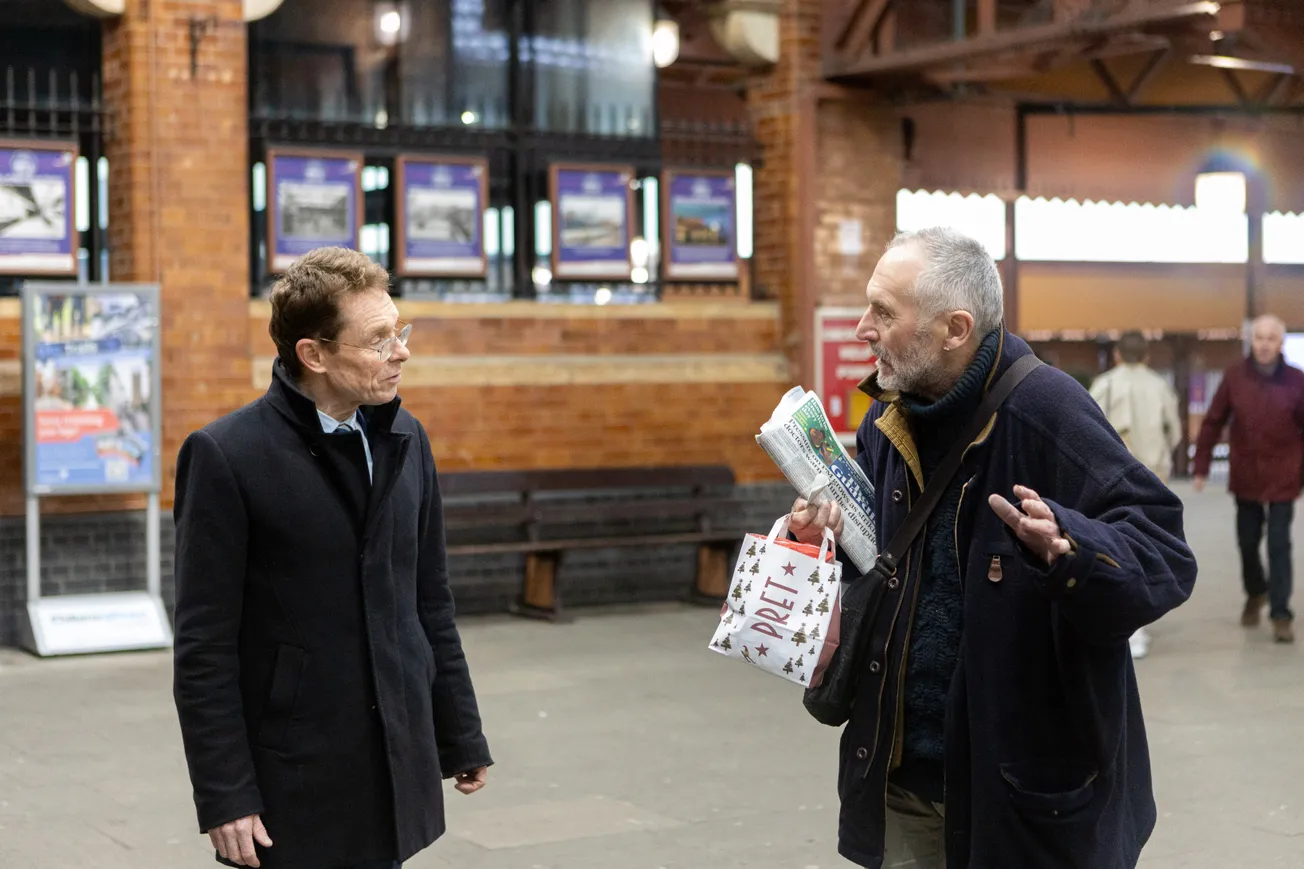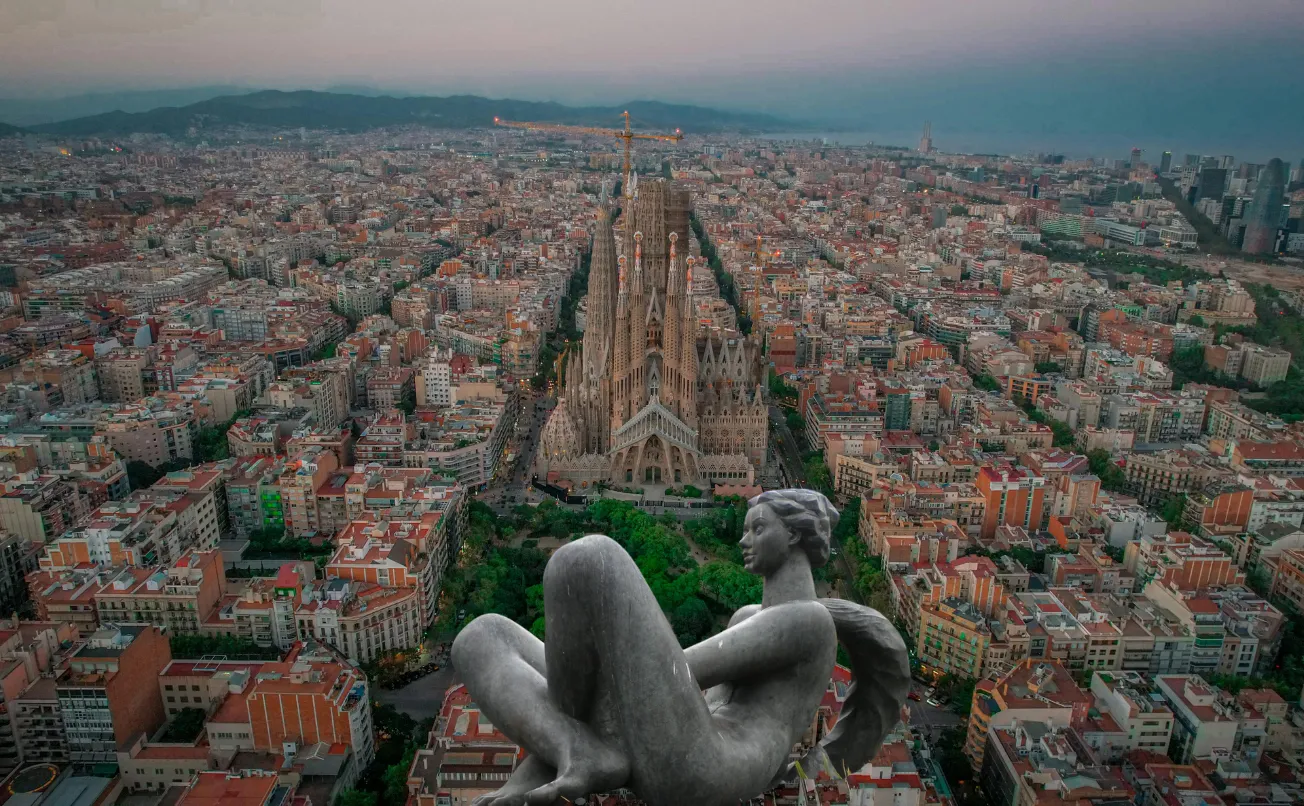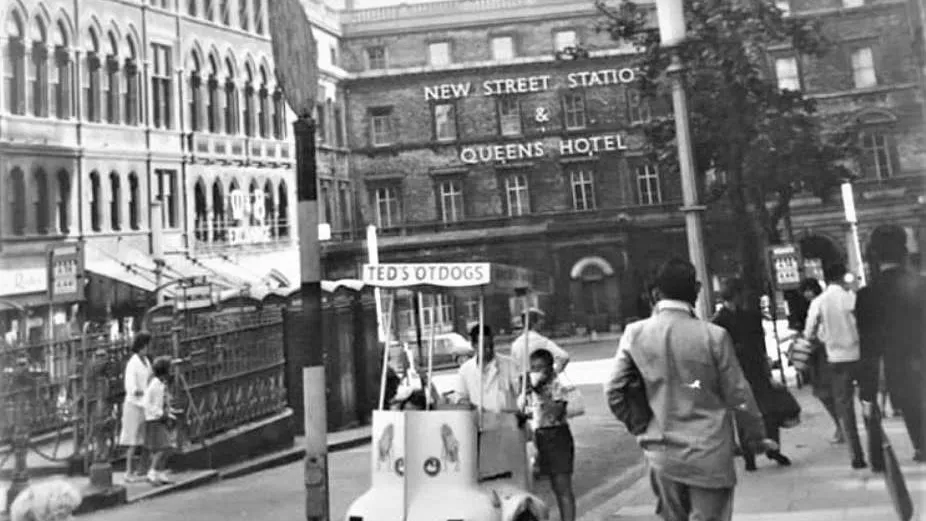Good morning readers — welcome to Thursday’s Dispatch.
I sat down with Mayor Andy Street recently for a wide-ranging conversation, the result of which is today’s article. I wanted to find out more about this group he has set up with Andy Burnham to try to get a high speed northern rail line built now the second leg of HS2 has been axed. I also asked him why he didn’t resign over that, given it was all over the papers around the time of the Tory conference in October.
Another thing I was interested to know is how it feels to go against your party leader, the prime minister — “uncomfortable” apparently — and if Street had any red lines that would cause him to turn away from the Tories for good. Interestingly, he doesn’t think the provocative remarks made by some party members are anything to worry about for now. On Suella Braverman’s lines about people living in tents as a “lifestyle choice” he said: “I just read that and thought ‘this is mad’”. Read on below your Brum in Brief to find out more.
Brum in Brief
🚆 The cost of HS2 London to Birmingham has ballooned to £66 billion, it has emerged. This amount is £8-£10bn higher than existing estimates thought to be based on 2019 prices which do not reflect the recent rise in inflation.
💰 Andy Street has said Birmingham City Council has “no choice” but to raise council tax. His comments come after it was revealed council leader John Cotton has asked the government for permission to raise council tax by up to 21% over two years.
🍽️ Kasia Piątkowska of Harborne restaurant Tropea has been nominated for the Good Food Guide UK ‘Chef to Watch’ award.
🖼️ The Ikon Gallery is closed throughout January while they install new exhibitions. It reopens on 8 February for two new shows and York Cafe at Ikon reopens this Saturday 13, Wednesday to Sunday, 11am-5pm.
🗣️ The Birmingham Language Exchange meets up on Thursdays at The Good Intent in the Great Western Arcade. I’ve been along to one of these before and they are a friendly bunch to practice many languages with. There’s a £1 fee and it starts at 7pm.
‘Uncomfortable’: Andy Street on challenging Rishi Sunak over HS2 — and why he didn’t resign
By Kate Knowles
On the Moor Street Station concourse, Andy Street is talking to a man carrying a Guardian newspaper. The man is friendly and enthusiastic; he tells the West Midlands mayor that while he might not always agree with him, he certainly respects him. This sort of interaction happens regularly, I’m told, because the mayor is a rare type of politician capable of doing what he believes is right while remaining approachable to residents who might hold an entirely different view. Then again, he would say that. He’s the mayor.
Andy Street is 60 years old. He was born in Oxfordshire but grew up in Birmingham. He went to Oxford University and enjoyed a long career in the south of the country, at John Lewis, where he reached the top most role of managing director. In 2008 he became vice chair of Performances Birmingham Ltd, which runs the Symphony and Town Halls. In 2011, he became chair of the then Greater Birmingham and Solihull Enterprise Partnership. He returned to Birmingham in 2016, just before entering politics.
Street is the first person to ever hold the office of mayor here and has won two elections as a Conservative since the position was established in 2017. He will fight for his third term in May. In an age where everyone — politician and influencer alike — has a brand, he has carefully pitched his as a wholehearted commitment to the West Midlands. “There’s something about this job. This is about you really being rooted in a place that you need to champion,” he says when we sit down to chat in the bar of the Clayton Hotel.

Such an occupational quirk is unique to metro mayors. Although MPs represent their local patches, they’re also meant to tow the party line nationally, meaning there’s less room for individualism or dissent. By contrast, the metro mayor system — which was enthusiastically pursued by Tony Blair in the early 2000s and picked up by George Osborne a decade later — takes its lead from the North American model, which allows for executive decisions to be streamlined. As The Economist wrote in 2015: “British policy makers from Michael Heseltine in the 1980s to Mr Blair and now Mr Osborne believe that US-style mayors can help tackle the entrenched problems of Britain’s cities. In their view city councils, with their squabbling factionalism, can hold British cities back.”
Street sees the role as creating a single point of accountability and stresses that all big decisions need to go through a board made up of council leaders from both major parties. “I think people have got to know who it is they are trusting; what their values are; what they stand for, what their ideas are. And I think it’s good that this system forces you to do that.”
It is only 3 o’clock, but the overcast sky outside the hotel is darkening. Obsolete Christmas decorations hang across the railing just behind Street’s chair. He lives locally in Birmingham city centre, where he bought his flat 11 years ago to be in the middle of things. “I can be involved in everything and see everything and [be] on hand for everything,” he says. “I love the city centre lifestyle. Many restaurants to dine at and many places to go.” His favourites are independently run businesses like La Galleria in Ethel Street and Noel’s restaurant near his home, the latter of which he describes as “another local Brummie businessman and [a] family thing. They look after you. That's the place I love.”

Last year, Street — alongside his Labour counterpart in Greater Manchester, Andy Burnham — negotiated “trailblazer” devolution deals with the government that saw another notable transfer of power away from Whitehall to England’s regions. Expanded powers in transport, skills, and housing now lie with the West Midlands Combined Authority (WMCA), the body that Street leads. Crucially, the WMCA now receives its own budget from the Treasury and decides how it sees fit to spend it, meaning that it now acts more like a government department, removing the need to constantly apply for small pots of money for a variety of different schemes.
Devolution has also brought another small but significant potential change: power over policing. Currently, the directly elected Police and Crime Commissioner (PCC) is in charge of policing. But Street has long coveted the powers won by a Labour candidate in all four elections to date. Before October 2023, metro mayors could bring policing powers under their remit if their combined authority voted for it. Street tried this in 2019, when a public consultation found residents were in favour of it. The WMCA, which has a Labour majority, voted it down.
But under new legislation, metro mayors can now write to the home secretary to request a merger, which Street did on 2 November. He was granted permission by secretary of state James Cleverly a month later. However, current PCC and lifelong legal aid solicitor Simon Foster has come out fighting against what he says is a “profoundly undemocratic” move to gain power by the back door. He promptly sought a judicial review on the grounds the decision was unlawful. Cleverly then launched a public consultation, after already announcing the merger, which Foster declared “farcical”. Foster has also challenged Street to a series of public debates.

The day we meet, Street has just responded to Foster, to ask if Labour is in favour of a merger or not. If Labour’s candidate for mayor, Richard Parker, wants a merger, Street argues, he should debate Parker. But if Parker is against the merger and wants to keep the elected PCC then, Street claims, he is more than happy to debate Foster. Parker has so far been silent.
Still following all of this? “I've been incredibly clear on my position, and to be fair, so has Simon, but he is not the Labour candidate for mayor,” Street tells me. “And that's what I want to know: what Labour’s position is.”
Street himself is no stranger to going it alone. He has, several times, recently contradicted his own party — including Prime Minister Rishi Sunak. From our seats on the first floor of the hotel, we have a view overlooking the machinery in the HS2 building site by Curzon Street just outside. When HS2 Phase Two, the high speed rail line to link Birmingham and Manchester, came under threat of cancellation by the government, both Street and Burnham hastily organised press conferences at the start of the Tory Party conference, where they let their commitment to the plans be known. Burnham didn’t mince his words, saying: “This government doesn’t care about levelling up the North.” Street, standing on the steps of The Midland hotel, took an unsurprisingly less combative tone. He acknowledged the spiralling costs of the project and the need to reassess, but said firmly: “We must not give up, we must stay the course, but we have to rethink radically how we are going about this.”

However divergent the two Andys’ statements, two months later, they came together to announce a collaboration — they had set up a group to find private investment to build their own northern high speed rail line. News stories in early December claimed the group would meet with ministers before 1 January, but that meeting has yet to happen. “I'm not worried about that in any way,” Street insists when I ask him about it. “Andy Burnham and I have met, and [Transport Secretary] Mark Harper is keen to get it in the diary, it is just a case of finding a time when we are all able to be in the same room together.”
Instead, Street says the focus should be on the fact that the prime minister has welcomed alternative proposals to replace the northern leg of HS2. He points to Sunak’s speech at the Conservative party conference, in which he did just this. “There was obviously a discussion with the Prime Minister's team about what would be said,” Street says. “And that was what we did. I was determined that he would say that in that speech, as that's the invitation to us to do this.”
Realising a new high speed rail connection between the two cities is no simple task. Not only did Sunak axe the funding for the extension, but he also did away with the safeguarding and acquisition of land necessary to build the infrastructure. HS2 Phase Two is itself split into different parts: 2a was meant to extend from Handsacre to Crewe, 2b from Crewe to Manchester Piccadilly. The safeguarding of land for 2a is to be lifted while 2b has until the summer, to allow the retention of any land needed to realise another major rail project: Northern Powerhouse Rail. Properties already acquired for Phase Two will be sold so the money can be used to buy the government out of unnecessary contracts. These actions saw Sunak accused of spitefully “salting the earth” to rid the possibility of a future government from reinstating the plans. Street, however, does not appear fazed. “Of course that impacts us,” he says. “We will bring our proposal to join up with the timetable they’ve set.” But what about 2a? And what about the money to pay off existing contracts? “We will present to him a business case that demonstrates it's the right thing to do in the total national interest.”
Since our conversation, news has emerged that it is very unlikely HS2 land will be sold before a general election. A story in The Observer suggests this paves the way for a Labour government to revive the project, but Sir Keir Starmer, while critical of its axeing, has not committed to reversing the decision should he become the next Prime Minister, something Street is quick to raise. It’s interesting, he says, that it isn’t the opposition party but he and Andy Burnham who stepped forward to fight for the second leg.

When I remind him that Burnham is a Labour politician, Street says: “He’s a member of the party, but he certainly isn't a member of Keir Starmer’s inner group. Anything but.” It's the mayoral role that has enabled the pair to do this “with credibility”, Street says. “I shall be slightly provocative here. I don't see the West Midlands MPs stepping forward in any really meaningful way over HS2. I don't see the Labour opposition frontbench stepping forward in any meaningful way.”
I ask Street how it feels to go against a party leader who is also the PM. “Uncomfortable,” he says. He says that as mayor, you do what is in the interest of the people you represent. He was “crystal clear” that defending HS2 was the right thing. When this was clearly not going to go the way he wanted it to, he had to adjust. “You have to change tack,” he says. Does he have a red line? Is there anything he would resign over, as he threatened to do over HS2? “I did not initiate the conversation about resigning, you know,” he clarifies. “It was the journalists who initiated the bloody conversation.”
He says two things ultimately persuaded him not to. “Number one — you might say this is immodest — I did not think it was in the interest of the people of the West Midlands for me to step aside, at that point.” Number two, he tells me, is his firm belief that to change things you have to be prepared to stay and fight.
I want to know whether this extends to the transphobic rhetoric employed by his colleagues at conference. Sunak courted gender sceptics with the lines: “We shouldn’t get bullied into believing that people can be any sex they want to be. They can’t. A man is a man and a woman is a woman. That’s just common sense.” Elsewhere, former home secretary Suella Braverman critcised “gender ideology”. Does he find that worrying? “Worrying, yes. That’s a fair word. But I don't see it as a defining moment for the party. And it sort of illustrates the point, doesn’t it, that I've got to stay in the party to fight these things.”
He gives me another example — Braverman’s comments about homeless people choosing to live in tents being a lifestyle choice. “I just read that and thought ‘this is mad’. It was her personal view. There are some moral issues for me, and if those moral issues were to be translated into a legislative programme, for example, of course you couldn't tolerate that. But I honestly don't think that's the point where we're at.”
If Street were to resign, it is difficult to imagine him outside either business or politics. What would he spend his time doing? Does he have hobbies? I am unsurprised to hear that “there is a very fuzzy dividing line between business and pleasure”, which he says he doesn’t mind in the slightest. When he does get time off, the thing he loves to do is “lose himself in the hills of Wales”, where he owns a holiday home with fellow Tory MP Michael Fabricant, who is there as we speak. Fabricant keeps sending Street “updates in the sun, while I’m stuck here,” he says.
Stuck here or not, there’s no escaping the fact that Andy Street is Birmingham’s highest profile politician and the most senior elected Tory outside of Parliament. As mayor of the West Midlands, he has slightly pushed beyond the boundaries of his party to try to achieve what he thinks is best for the region. How far he is willing to go remains to be seen.








Comments